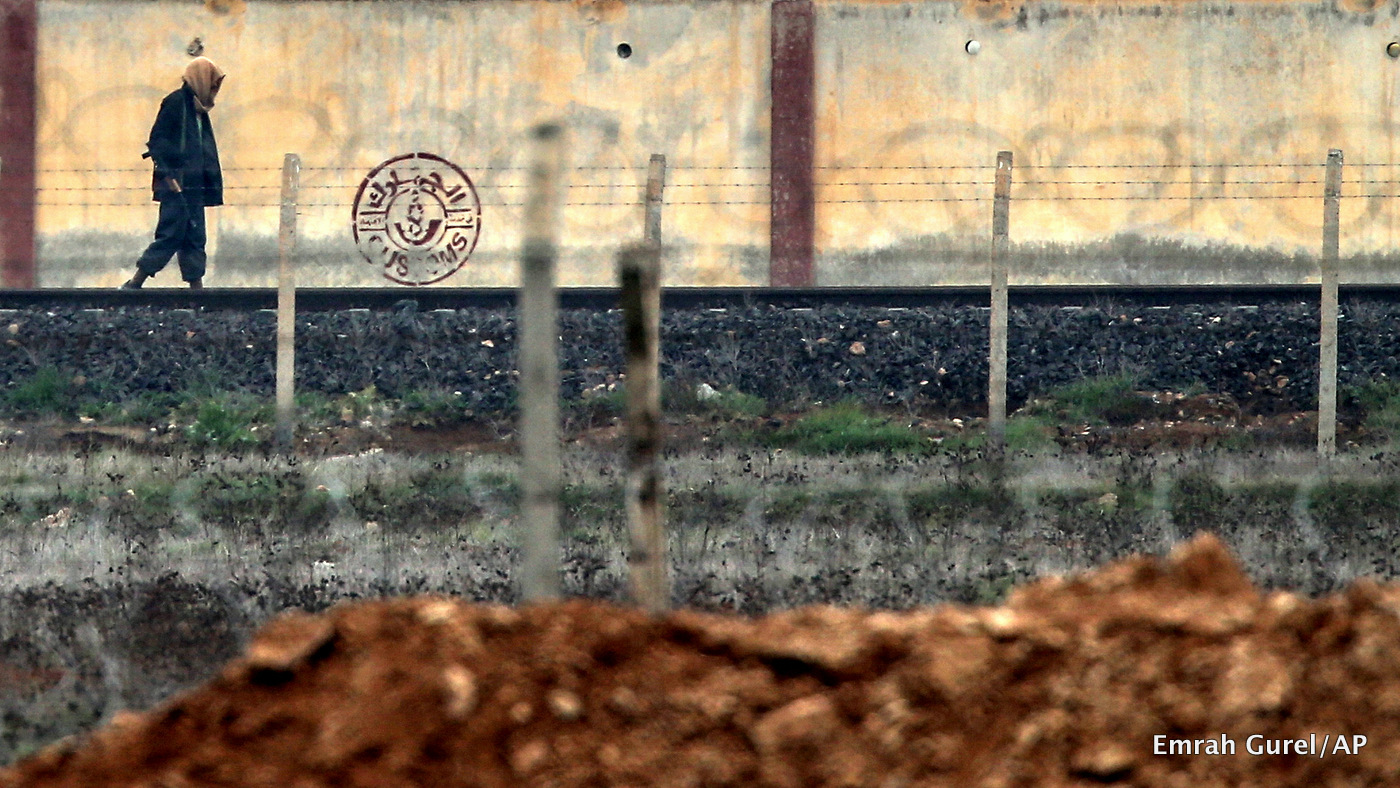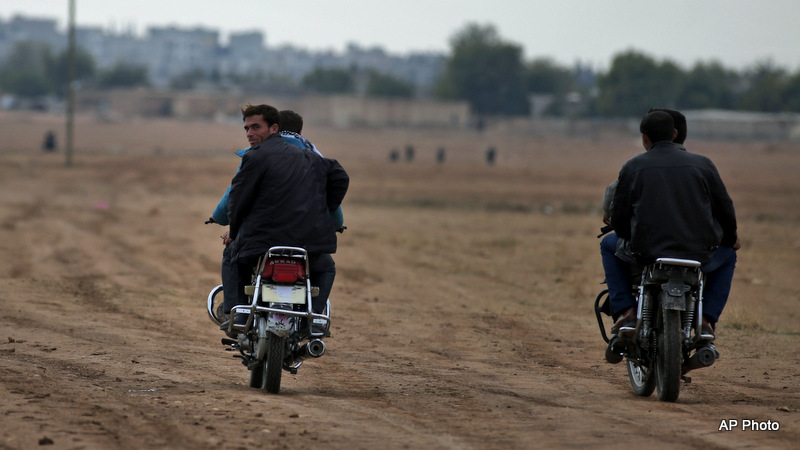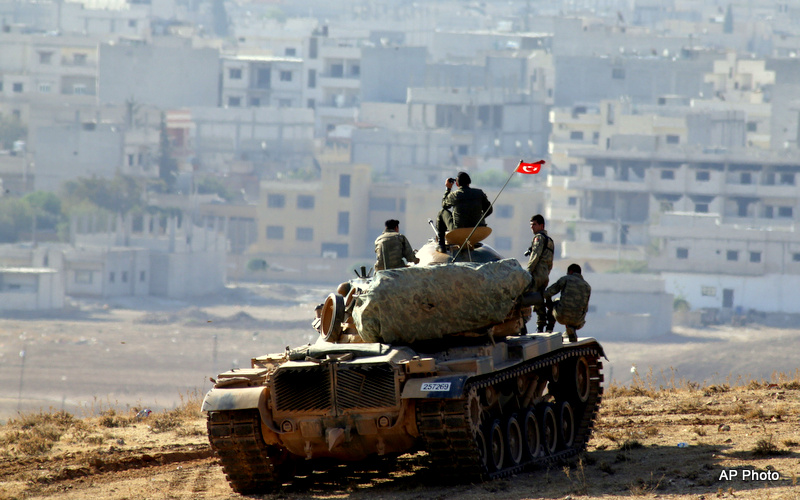 An armed man walks in ISIS controlled Tal Abyad across the Turkish Akcakale border gate, Turkey, Saturday, Jan. 31, 2015.
An armed man walks in ISIS controlled Tal Abyad across the Turkish Akcakale border gate, Turkey, Saturday, Jan. 31, 2015.
BEIRUT, Lebanon — The Islamic State is currently bearing the brunt of a military campaign involving some 62 countries from around the world. The US Air Force, together with regional partners, is bombing it from the air. On the ground it is surrounded by hostile forces: the Kurdish YPG, the peshmerga, the armies of Syria and Iraq and the beleaguered Free Syrian Army.
It was presumably with at least some of this knowledge that three British schoolgirls set off for Turkey this week with the apparent intention of crossing into Syria and joining the terror group.
Shamima Begum, 15, Kadiza Sultana, 16, and an unnamed 15-year-old — all friends at the same school in east London — flew to Istanbul on Tuesday evening. Police believe the girls are aiming to travel to Syria, but told the BBC that there is a “good chance” they are still in Turkey.
What would compel these three teenagers to embark on such a seemingly perilous journey? What gave them the confidence to assume they would be successful?
Putting aside the ideological pull the girls might have felt, one answer is that it is still remarkably easy to travel to Islamic State (IS) strongholds in Syria.
Porous and awash with smugglers
 Syrian Kurdish fighters ride motorcycles on the outskirts of Suruc, on the Turkey-Syria border, as they try to approach the border to cross into Syria to rejoin the fighting In Kobani, background, Friday, Oct. 17, 2014.
Syrian Kurdish fighters ride motorcycles on the outskirts of Suruc, on the Turkey-Syria border, as they try to approach the border to cross into Syria to rejoin the fighting In Kobani, background, Friday, Oct. 17, 2014.
Turkey is the most popular crossing point for those hoping to join the group. A ticket from Luton airport to Gaziantep, around 40 miles from the border, costs around $180 — one way, of course. From there it’s a short car ride to one of the border towns, where one can pay a smuggler $20 to cross over into Syria, according to a report in the Wall Street Journal.
That same report found that despite international pressure on Turkey to try to prevent the flow of foreign fighters into Syria, the border remains porous and awash with smugglers.
Stopping wannabe jihadists from entering Syria has long been touted as a crucial part of weakening IS. But progress on the issue has been glacial over the past two years — even as the US has taken on a greater role in fighting in Syria and Iraq.
The towns that lie close to the main crossing points into Syria’s north, such as Killis and Reyhanli, share a similar rhythm. They are populated by smugglers, refugees, fighters, jihadists and aid workers, and also an unknown (but certainly large) number of Western spies.
A year ago, UK officials described the border as being “inundated” with spooks aiming to keep tabs on foreign fighters. That was before the current anti-IS coalition began bombing, so one can assume it has only got busier.
Back then, the arrivals lounge at Gaziantep airport was often empty and anyone could walk through unchallenged and hop into cars with Syrian plates.
Under pressure from its Western allies, Turkey has pledged to crack down on jihadists trying to cross the border. It has increased deportations of suspected fighters, restricted travel and created “risk analysis units” whose aim is to “weed out suspected jihadists in airports and collaborating closely with European intelligence agencies,” according to the WSJ.
Failing to stop the flow
 Turkish soldiers on a tank hold their position on a hilltop on the outskirts of Suruc, at the Turkey-Syria border, overlooking Kobani.
Turkish soldiers on a tank hold their position on a hilltop on the outskirts of Suruc, at the Turkey-Syria border, overlooking Kobani.
But despite all these measures, US counterterrorism officials say the number of fighters heading to Syria is continuing to grow. More than 20,000 foreign fighters have traveled there over the course of the war, according to testimony given by Nick Rasmussen, director of the National Counterterrorism Center, at a hearing of the House Committee on Homeland Security. And most of them are joining the Islamic State.
Around 3,400 of those fighters came from Western countries, and among them were 150 US citizens or residents, according to Rasmussen.
So why has Turkey, together with its friends in the Western spy agencies, been unable to stop the flow?
For the West, there are practical and legal considerations. Turkey’s strident opposition to Syrian President Bashar al-Assad is another — it has in the past shown willingness to turn a blind eye to any force that might help speed his removal from power.
There is also the worry in Ankara that closing the border with Syria completely would lead to reprisals inside Turkey. This appears to be something Turkish leaders do not want to risk at this time.

